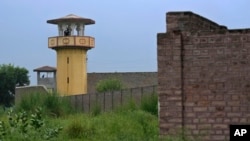The United States on Monday described the arrest of Pakistan's former Prime Minister Imran Khan over the weekend as an "internal matter" for the South Asian nation, while the United Nations called for respecting due process in proceedings against the embattled politician.
The 70-year-old Pakistani opposition leader was taken into custody Saturday and swiftly transferred to Attock prison, west of the national capital, Islamabad, after being sentenced to three years for selling state gifts and allegedly concealing their proceeds.
"We believe that is an internal matter for Pakistan, and we continue to call for the respect of democratic principles, human rights, and the rule of law in Pakistan,” U.S. State Department spokesman Mathew Miller told reporters in Washington when asked for his reaction.
Miller dismissed suggestions the U.S. response to the troubles facing Khan was muted compared with the prosecution of politicians elsewhere in the world because the former Pakistani leader was a known critic of Washington's policies.
"Let people characterize their responses," Miller said. "At times there are cases [around the world] that are so obviously unfounded that the United States believes it should say something about the matter. We have not made that determination here."
In New York, United Nations Secretary-General Antonio Guterres called for all parties Monday to refrain from violence.
"[Guterres stressed] the need to respect the right to peaceful assembly,” U.N. spokesperson Farhan Haq told reporters. “The secretary-general urges the authorities to respect due process and the rule of law in proceedings against the former prime minister."
Khan denies the corruption allegations, saying they are politically motivated to keep him from contesting a general election due later this year. Unless overturned by an appeals court, the conviction will disqualify him from running in a national election for five years.
On Monday, the cricket star-turned-politician was allowed to meet with one of his lawyers at the jail for the first time to prepare an appeal of his conviction.
Shah Mahmood Qureshi, who is leading the Pakistan Tehreek-e-Insaf (PTI) political party while Khan is in jail, said the former prime minister was being held in an "insect-ridden" cramped room and being denied privileges, including television, books, and newspapers, that he is entitled to as a former leader of the country.
"The conditions are deplorable. He is being kept in a cell where hygienic conditions are terrible," Qureshi told a news conference along with Khan's legal team. "There are no separate toilet facilities. The room is dark and tangy. The basic rights that even an ordinary prisoner under the prison rules can access, he has been deprived of."
Qureshi condemned the government for placing Khan in the notorious British colonial-era prison and said his party would approach the country's superior judiciary to secure their leader better conditions. He also denounced a police crackdown and subsequent detention of PTI supporters protesting Khan’s arrest.
Pakistani officials deny they have anything to do with the court ruling or legal proceedings. Government officials have not yet commented on allegations that Khan was being mistreated in prison.
Khan was ousted from power in April 2022 in a parliamentary vote of no-confidence, which he rejected as illegal and orchestrated by Pakistan's powerful military to enable incumbent Prime Minister Shehbaz Sharif to replace him. The deposed leader initially blamed the U.S. for being behind the vote, charges Washington and Islamabad reject.
The ousted Pakistani leader has long publicly criticized the U.S.-led war on terrorism in neighboring Afghanistan, which continued for almost two decades until 2021, with American counterterrorism drone strikes hitting suspected targets on both sides of the border.
Pakistani authorities have instituted scores of cases against Khan since his removal from power. He was also arrested in May in a separate case, but the country's Supreme Court outlawed the move a couple of days later.
The brief arrest, however, sparked nationwide protests by his supporters, who clashed with riot police. Protesters also stormed military installations in some cities, prompting a crackdown on PTI workers and the detention of thousands, with more than 100 put on trial in controversial Pakistani military courts.
"I will dissolve my government and the National Assembly on August 9," Sharif told a rally in Punjab province Sunday. "After that, an interim government will take over, and elections will be held," he said.
Despite all the legal troubles and crackdown facing Khan, analysts say he remains the most popular politician in Pakistan and his party is rated as the country's largest political force.
The military has ruled Pakistan over nearly half its 75-year history by staging coups against elected governments. Generals have influenced political happenings even when they are not in power and orchestrated the toppling of prime ministers because they had fallen out with the military.
"In the past, parties and leaders have been cut down to size, their leaders have been imprisoned, and that hasn't stopped some from returning," said Michael Kugelman, the director of the South Asian Institute at Washington's Wilson Center.
"PTI enjoys public support and benefits from strong anti-incumbency. It can pull through if it gets the right leadership and isn't banned," Kugelman wrote on Twitter.




